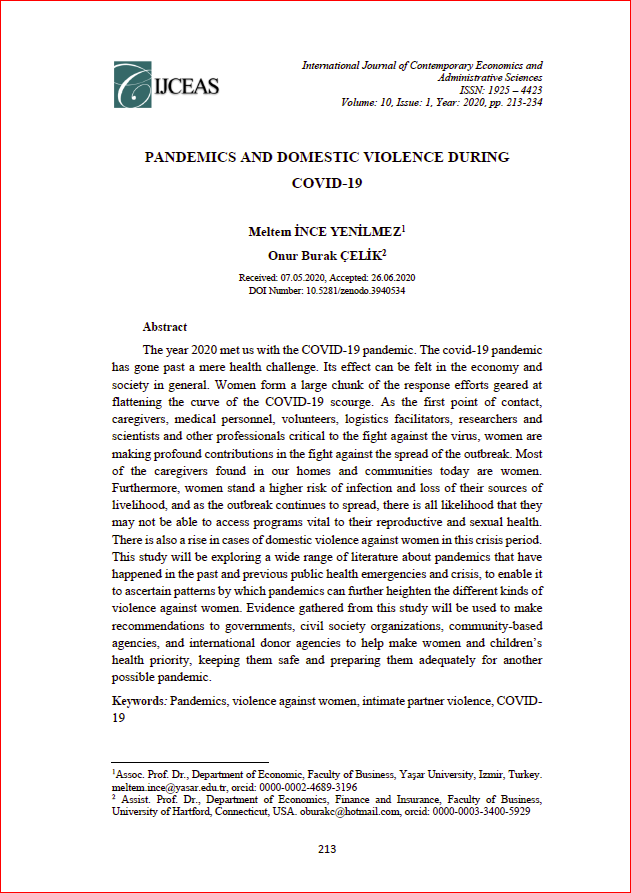Pandemics and Domestic Violence during Covid-19
DOI:
https://doi.org/10.5281/zenodo.3940534Özet
The year 2020 met us with the COVID-19 pandemic. The covid-19 pandemic has gone past a mere health challenge. Its effect can be felt in the economy and society in general. Women form a large chunk of the response efforts geared at flattening the curve of the COVID-19 scourge. As the first point of contact, caregivers, medical personnel, volunteers, logistics facilitators, researchers and scientists and other professionals critical to the fight against the virus, women are making profound contributions in the fight against the spread of the outbreak. Most of the caregivers found in our homes and communities today are women. Furthermore, women stand a higher risk of infection and loss of their sources of livelihood, and as the outbreak continues to spread, there is all likelihood that they may not be able to access programs vital to their reproductive and sexual health. There is also a rise in cases of domestic violence against women in this crisis period. This study will be exploring a wide range of literature about pandemics that have happened in the past and previous public health emergencies and crisis, to enable it to ascertain patterns by which pandemics can further heighten the different kinds of violence against women. Evidence gathered from this study will be used to make recommendations to governments, civil society organizations, community-based agencies, and international donor agencies to help make women and children’s health priority, keeping them safe and preparing them adequately for another possible pandemic.The year 2020 met us with the COVID-19 pandemic. The covid-19 pandemic has gone past a mere health challenge. Its effect can be felt in the economy and society in general. Women form a large chunk of the response efforts geared at flattening the curve of the COVID-19 scourge. As the first point of contact, caregivers, medical personnel, volunteers, logistics facilitators, researchers and scientists and other professionals critical to the fight against the virus, women are making profound contributions in the fight against the spread of the outbreak. Most of the caregivers found in our homes and communities today are women. Furthermore, women stand a higher risk of infection and loss of their sources of livelihood, and as the outbreak continues to spread, there is all likelihood that they may not be able to access programs vital to their reproductive and sexual health. There is also a rise in cases of domestic violence against women in this crisis period. This study will be exploring a wide range of literature about pandemics that have happened in the past and previous public health emergencies and crisis, to enable it to ascertain patterns by which pandemics can further heighten the different kinds of violence against women. Evidence gathered from this study will be used to make recommendations to governments, civil society organizations, community-based agencies, and international donor agencies to help make women and children’s health priority, keeping them safe and preparing them adequately for another possible pandemic.

İndir
Yayınlanmış
Nasıl Atıf Yapılır
Sayı
Bölüm
Lisans
The Author(s) must make formal transfer of copyright for each article prior to publication in the International Journal of Contemporary Economics and Administrative Sciences. Such transfer enables the Journal to defend itself against plagiarism and other forms of copyright infringement. Your cooperation is appreciated. You agree that copyright of your article to be published in the International Journal of Contemporary Economics and Administrative Sciences is hereby transferred, throughout the World and for the full term and all extensions and renewals thereof, to International Journal of Contemporary Economics and Administrative Sciences.
The Author(s) reserve(s): (a) the trademark rights and patent rights, if any, and (b) the right to use all or part of the information contained in this article in future, non-commercial works of the Author's own, or, if the article is a "work-for-hire" and made within the scope of the Author's employment, the employer may use all or part of the information contained in this article for intra-company use, provided the usual acknowledgements are given regarding copyright notice and reference to the original publication.
The Author(s) warrant(s) that the article is Author's original work, and has not been published before. If excerpts from copyrighted works are included, the Author will obtain written permission from the copyright owners and shall credit the sources in the article. The author also warrants that the article contains no libelous or unlawful statements, and does not infringe on the rights of others. If the article was prepared jointly with other Author(s), the Author agrees to inform the co-Author(s) of the terms of the copyright transfer and to sign on their behalf; or in the case of a "work-for-hire" the employer or an authorized representative of the employer.
The journal is registered with the ISSN : 1925-4423.
IJCEAS is licensed under a Creative Commons Attribution 4.0 International License.
This license lets others distribute, remix, tweak, and build upon your work, even commercially, as long as they credit you for the original creation. This is the most accommodating of licenses offered. Recommended for maximum dissemination and use of licensed materials.

